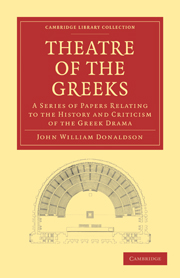II - FROM BENTLEY'S DISSERTATION UPON THE EPISTLES OF PHALARIS
Published online by Cambridge University Press: 06 December 2010
Summary
In the fifty-first Epistle to Eteonicus, there is another moral sentence: θνητοὺς γὰρ ὄντας ἀθάνατον ἀργὴν ἔχειν, ὡς ϕασί τινες, οὐ προσήκει' “Mortal man ought not to entertain immortal anger (a).” But, I am afraid, he will have no better success with this than the former; for Aristotle, in his Rhetoric, among some other sententious verses, cites this Iambic, as commonly known:
Άθάνατον όργὴν μὴ ϕύλαττε, θνητός ὢν.
This, though the author of it be not named, was, probably, like most of those proverbial gnomce, borrowed from the stage; and, consequently, must be later than Phalaris, let it belong to what Poet you please, Tragic or Comic.
But, because it may be suspected that the Poet himself might take the thought from common usage, and only give it the turn and measure of a verse, let us see if we can discover some plainer footsteps of imitation, and detect the lurking sophist, under the mask of the tyrant. Stobams1 gives us these verses, out of Euripides’ Philoctetes:–
Ώσπερ δὲ θνητὸν καὶ τὸ σῶμ' ἡμῶν ἔϕν,
Οὕτω προσήκει μηδὲ τὴν ὀργὴν ἔχειν
Άθάνατον, ὄὄστις σωϕρονεῖν ἐπίσταται.
Now to him that compares these with the words of this epistle, it will be evident that the author had this very passage before his pen: there is and not only a sameness of sense, but even of words, and those not necessary to the sentence; which could not fall out by accident.
- Type
- Chapter
- Information
- Theatre of the GreeksA Series of Papers Relating to the History and Criticism of the Greek Drama, pp. 195 - 288Publisher: Cambridge University PressPrint publication year: 2010



